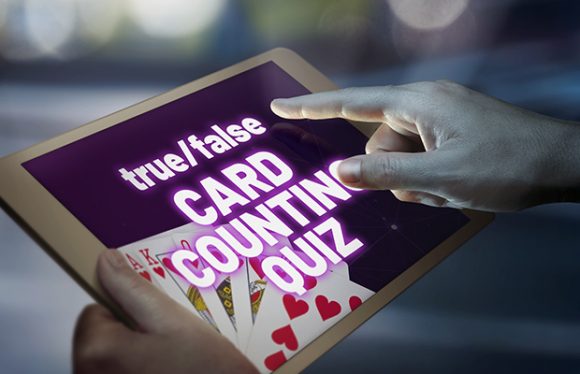True or False: Card Counting Quiz

What do you really know about card counting in online blackjack?
In all of gambling, perhaps no concept is simultaneously so well-known and so misunderstood.
Maybe it’s because of appearances in popular movies. Or maybe it’s the seductive appeal of actually gaining a player edge against the house, instead of the other way around!
Whichever way you slice it, card counting might be the hottest topic in the whole of the world’s most popular casino game.
Unfortunately, most players’ understanding of how card counting works is waaaaaay off base.
Are you one of them?
Or are you one of the blessed few whose understanding outstrips the average Joe or Jane’s imagination?
Take this quick quiz to find out! If you get any answers wrong, visit our site’s card counting section to arm yourself with the best knowledge possible.
Questions: True or False
- Card counting is illegal.
- Counting cards is best left to math geniuses only.
- Card counters win every time they play.
- You must have a massive bankroll in order to count cards effectively.
- Casinos will take you into a backroom and beat you up if they catch you card counting.
- The most importantfactors that a card counter looks for in a game are a) the percentage of cards dealt prior to shuffling and b) the house/table playing and betting rules.
- The odds in blackjack are not constant from one round to the next.
- Removing small cards (2 through 6) from the deck has a positive effect on a player’s expectation.
- When the deck becomes richer in large cards, the card counter has the edge, and should increase the bet size.
- Card counters lose more hands than they win.
- There is only one way to count cards.
- Card counters need to disguise their method of play.
- Card counters use their count to vary the size of their bets and sometimes their strategy.
- Card counters can enjoy a 10% edge over the casino.
- Most professional blackjack players play on blackjack teams.
- Card counters can still win even when the casino uses a continuous shuffling machine.
- Over-betting when you card count is a major downfall of most beginning card counters.
Answers
- Though using external devices to aid is in fact illegal, it’s not against the rules to use your brain while playing blackjack. Casinos don’t like it, but it’s not illegal.
- To judge from popular movies, math savants and top-level MIT students are the only people alive who can effectively count cards. Far from it! Anyone who can read, write, and do addition and subtraction in theirvhead can learn to count… after all, it’s called card counting, not card multivariable calculus!
- A card counter’s edge is very small – sometimes less than 1% over the house – so losing sessions should be expected. However, over the long haul, counters will win more money than they lose.
- A smaller bankroll only means that playing at a lower minimum bet size table is advisable. What matters for a card counter, or for any advantage player, is to play with bankroll is large enough – relative to the bet size – to withstand short-term losing streaks.
- Although this has occurred in the ‘bad old days’ of mafia-run casinos, this is a thing of the past. Legal settlements in players’ favor have made the financial liability too great for casinos to engage in this kind of stuff anymore. These days, a simple player ban is the preferred casino defense mechanism.
- The percentage of cards dealt is known as “deck penetration.” The deeper the penetration (the more cards a player sees before the deck or shoe is reshuffled), the more profitable the game will be for a card counter. Additionally, counters also look for tables with player-favorable rules, eschewing rules that weaken a player’s edge like 6:5 payouts.
- The odds change depending on what cards were played (and removed) in previous rounds. This the exact reason that card counting is so useful!
- The removal of small cards (2–6) results in the deck’s becoming richer in large cards (i.e., 10, J, Q, K, Aces). That’s better for a card counter for the following reasons: it makes a blackjack (with its 3:2 payout) more likely; it makes doubling down more profitable because bigger are better in this situations; an abundance of large cards favors pair splitting; the dealer busts more frequently with an up-card of 2 through 6 upcard; and the insurance bet becomes profitable.
- For the reasons mentioned above, the card counter should increase his or her bets when the deck becomes richer in large cards.
- Counters actually lose more hands than they win, but they win more money than they lose. How? It’s simple! They bet more when the odds favor them, and less when they don’t.
- There are dozens of established card counting systems, ranging from the popular, relatively simple Ace-Five to the diabolically complex Wong Halves.
- In order to prolong their playing careers, most card counters try to disguise the fact that they are card counting from the house. After all, a banned player can’t win any more money!
- This is the whole point of counting cards! Not only will a card counter bet more when the count favors them, they will vary their playing strategy as well. (For example, if the deck is rich in high cards, a player holding 10-6 would stand rather than hit with the dealer showing a 10.)
- The edge a card counter enjoys usually fall between 0.5–1.5%.
- Playing on a team reduces bankroll risk and increases profitability.
- Though there have been a few isolated cases of counters using very advanced techniques to gain the edge against a continuous shuffling machine (CSM), for the most part card counting doesn’t work when a CSM is used.
- The biggest downfall of most beginner card counters is poor bankroll management. Most players will bring a bankroll large enough to withstand a losing streak or two, but not enough to then increase bet size when the count turns to their advantage. This robs of them of their opportunity to cash in on their hard work!












